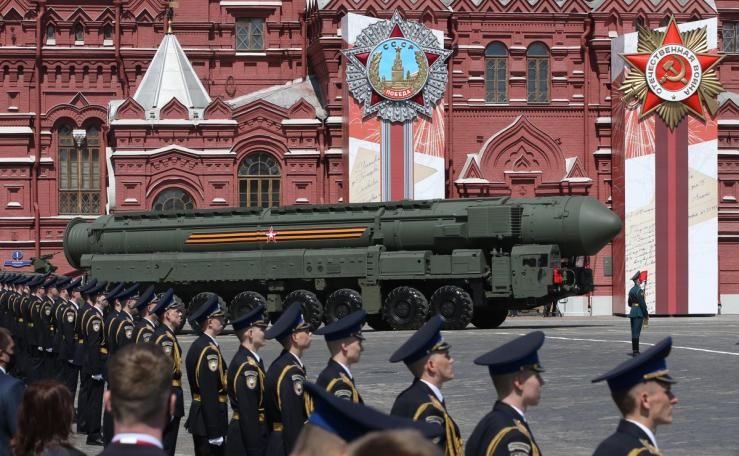The News
Russian President Vladimir Putin ordered military exercises focused on the “preparation and deployment” of tactical nuclear weapons, the Russian military announced Monday.
This is the first time Russia has declared publicly that it will conduct drills involving tactical nuclear weapons, although its military regularly holds nuclear exercises. Tactical nuclear weapons are designed for battlefield use, and represent the kind of escalation Western officials have feared that the Kremlin might opt for in Ukraine.
The defense ministry said the exercise will involve forces of the Southern Military District, which includes Russia-occupied Ukraine and parts of Russia that border on Ukraine, adding that it was in response to “provocative statements and threats” by the West.
Kremlin spokesperson Dmitry Peskov elaborated that the drills are a response to French President Emmanuel Macron recently doubling down on the possibility of sending troops to Ukraine, and similar statements from Western officials. “This is a totally new level of escalating tensions. It is unprecedented, it demands special attention and special measures,” Peskov said.
Maj. Charlie Dietz, a Pentagon spokesperson, told Semafor that “Russia’s attempt to use military exercises involving nuclear weapons as a pressure tactic is irresponsible.” He added that the US Department of Defense had not seen a reason to adjust its nuclear posture or indications that Russia is preparing to use a nuclear weapon.
SIGNALS
Russian nuclear threats aim to deter the West
Russia has sought to limit the West’s involvement in Ukraine by threatening to go nuclear. The nuclear messaging has consistently followed the Kremlin’s fortunes on the battlefield, with threats ramping up when Russia is on the backfoot, a report from the Washington-based think tank Center for Strategic and International Studies found. “This is not about the exercise itself, it’s about going public with it to send a signal,” Nikolai Sokov, a Russian nuclear expert at the Vienna Center for Disarmament and Non-Proliferation, wrote on X. While some experts have emphasized the risks of escalation with the world’s largest nuclear power, others have warned that yielding to nuclear blackmail would only encourage more threats in the future.
Experts divided on how the West should respond
Russia’s nuclear threats regularly leave Western security officials guessing about Putin’s intentions and whether increased support for Ukraine would lead to a nuclear crisis. Amy Woolf, a nonresident senior fellow at the Atlantic Council said the West would be best served paying little attention to Russia’s nuclear drills. “Exercises happen … and it would help cheapen the currency of nuclear signals to just ignore this,” she wrote on X. Pavel Podvig with the the United Nations Institute for Disarmament Research called on the international community to condemn the exercise: “The right response is to double down on ‘nuclear threats are inadmissible’ and rally everyone around that.”
Russian media hypes up nuclear tensions
In Russian media, commentators and political pundits have been eager to express their confidence in the country’s nuclear strength. Last week, staunch pro-Putin news presenter Dmitry Kiselyov warned that if NATO troops go to Ukraine, “we’ll send everything flying everywhere.” He claimed that Russian nukes would target US nuclear launch sites, France will be “disarmed in an instant,” and “the British isles will simply go underwater.” Last year, Western researchers were perturbed when once-restrained Russian nuclear experts threw caution to the wind and called for the possibility of preemptive nuclear use. Nobel prize-winning journalist Dmitry Muratov said that coverage of Russian nuclear weapons has become so commonplace on television that it “already looks like an advertisement for dog food.”



